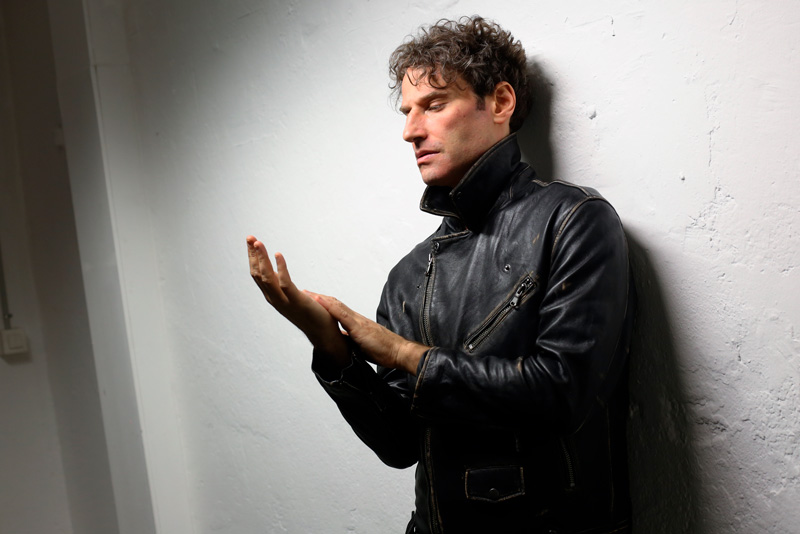Greilsammer, new director of Filarmed
Israeli conductor and pianist David Greilsammer, recognized as one of the most daring and adventurous artists in the classical world, has recently been appointed as chief conductor of Filarmed, starting in August 2022. Get to know him.
“…the orchestra is like a family, like a great community in which we have to take care of each other.” David Greilsammer, chief conductor
Greilsammer committed to Filarmed's purpose
The Medellín Philharmonic Orchestra strengthens close relationships and aims to transform with music.
In 2021, the Orchestra won the Latin Grammy for Best Latin Music Album for Children for Tu Rockcito Filarmónico, and in 2022 it received the Classical:NEXT Innovation Award, in recognition of an Orchestra management model that strengthens close relationships , believes in music as an agent of social transformation and focuses its efforts on programs that bring symphonic music to all populations in the region, reaching unconventional spaces and serving vulnerable populations.
Thinking the orchestra for the future
Filarmed is currently in one of the most interesting moments in its history. In the next five years it will work on four fronts: first, to be a musical reference in Latin America, to be recognized as one of the most important orchestras in the region and even worldwide. Second, to be a bold and innovative organization, which can produce captivating experiences with versatile musicians; that beyond playing an instrument well, they work with others and with other artistic disciplines. Third, to be an orchestra rooted in and committed to all types of populations in diverse territories, putting its capabilities at the service of social transformation, using music to improve the lives of all, and finally being a sustainable orchestra financially, organizationally and the environmental.
What does it mean to you to be the principal conductor of the Medellín Philharmonic Orchestra?
David Greilsammer: “First, I am honored and proud to become the music director and principal conductor of such an extraordinary orchestra, in a city I love so much. Colombia – and especially Medellín – have a very special place in my heart, and since I came for the first time a few years ago, I have fallen in love with the people, the traditions, the hospitality, the generosity, the music, the dancing, the food and nature. Medellín and the Antioquia region are so beautiful and have a rich and fascinating history, so it feels very special to be part of such a powerful cultural heritage. In my opinion, the Medellín Philharmonic Orchestra is already one of the best orchestras in Latin America, with a unique artistic identity and a fabulous group of musicians who are dedicated to bringing joy and beauty to their audiences. “I can’t wait to begin this extraordinary journey.”
How do you want Filarmed to be recognized worldwide?
DG: “In the coming years we will work intensely on the development of the orchestra's sound, its identity, its virtuosity, its musical ideas, its artistic adventures. I would like Filarmed to become a leader in the orchestral world, combining its musical excellence, its originality, its Colombian and Latin American traditions, and its very warm human spirit, to be able to offer spectators unforgettable and exciting concerts. that will have a unique impact on their lives.”
What will be the artistic plan during your tenure as chief director of Filarmed?
DG: “As soon as my term begins, together with the musicians and the team, we will begin to work intensively on a variety of artistic aspects: our sound, our style, our musical ideas, our rhythmic power and repertoire. There are many types of repertoire that I would love to develop with the orchestra, such as the baroque and also the music of the 20th and 21st centuries, which are so important. And, of course, we will continue to explore the classical and romantic repertoire, but my goal is also to offer a new point of view to these famous masterpieces: a fresh and original interpretation that will bring more excitement and wildness to our performances. And, of course, I hope to develop our educational and social programs, which are so important!”
Why should the Medellín Philharmonic Orchestra focus on developing and strengthening the educational and social programs it currently carries out in various sectors of the community?
DG: “One of the most important missions that all orchestras have is to bring music to more people, everywhere, even to those who do not have the opportunity or the possibility to go to concerts. If we want classical music to be alive in the coming decades, we have to open it up to more communities, and especially to the young generation. This is perhaps our most important mission: to share classical music with humans in all parts of society and to ensure that all people have access to the highest quality music. Filarmed has been doing amazing work in recent years with children and I will be very happy to be part of this activity. I hope to work with my colleagues in the orchestra so that we can continue building new social programs and educational projects, not only in Medellín, but in many areas of Antioquia and Colombia!”
Why do you think music is an agent of social transformation?
DG: “Music is the most universal language we have in the world. Music lives inside our bodies, inside our hearts, inside our souls. Music has the power to change people's lives and I am convinced that it has the ability to reduce violence and injustice. Music, arts and culture are the best response to intolerance, racism and hate. The more people play musical instruments, dance and sing, the better our world will be. That is why orchestras must be strong leaders in our society.”
What are the lessons that music has taught you along this path as a performer and director?
DG: “In my journey as an artist I have learned how much power music can have and how much it can change the destiny of humans. Beyond its beauty, music also brings hope to people's lives and teaches you to be generous, enthusiastic, bold and humble. As a conductor, I have the opportunity to work with a community of musicians, as part of a group. It is a great privilege to be part of a collective and create projects in collaboration with many wonderful musicians.”
How do you think the interest of the next generations in classical music can be achieved?
DG: “I think that the musical programs and projects presented by orchestras and ensembles have to be much more exciting, bold, modern, wild and original. Many orchestras in the world still present only programs that are extremely old and traditional, and this is a big problem. We need to build projects that excite the public, and this can be achieved by creating encounters with other styles of music and with other art forms. Classical music needs to be inspired by other artistic disciplines and other musical worlds, such as jazz, rock or folk music, and I am glad that Filarmed is already doing so many projects in this direction! And in the coming years, of course, we will continue to develop these special and original projects, because they have the ability to attract the attention of new audiences who have never been to a classical music concert in their lives.”
The theme of the 2022 Season is diversity, why is it so important to you?
DG: “Our world is changing very quickly, and in recent years there have been great transformations in our society. We have seen the significant impact of the #MeToo movement, the Black Lives Matter movement, the LGBTQ movement, the environmental movement, as well as many other important social developments. These movements are so important because they have made us more aware of the need for diversity in our lives. If we want to have more equality, justice and tolerance in our society, we have to continue fighting for more diversity, every day. We cannot allow inequality to be a part of our world anymore. And I believe that the cultural world must be part of this fight. “I am very happy and proud to have this as our theme for 2022.”
After several experiences with our Orchestra, how do you define the public of our city?
DG: “I love the public in Medellín, because they are so warm, enthusiastic and curious! The auditors of this city are always open to discovering new sounds, new visions, new projects and new proposals. It is a very adventurous audience that wants to be inspired and is always happy to embark on surprising and unexpected journeys. But, above all, it is an audience in love with music, all kinds of music! Wherever you go in Medellín, you hear music: salsa, reggaeton, classical, jazz, tango... the people of the city breathe music, it is part of their lives and bodies, every minute of the day and night, I love it, that !”









